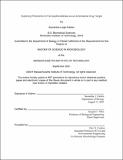Exploring Protoheme IX Farnesyltransferase as an Antimalarial Drug Target
Author(s)
Edelen, Samantha Leigh
DownloadThesis PDF (5.097Mb)
Advisor
Niles, Jacquin C.
Terms of use
Metadata
Show full item recordAbstract
The search for novel antimalarials continues due to the need to combat the rapidly increasing prevalence of multidrug resistant Plasmodium species parasites that cause malaria. Recent advances in technology to genetically modify malarial parasites and methods for high throughput screening of compounds allow for increased understanding of Plasmodium biology and evaluation of potential inhibitors. The Plasmodium falciparum genome continues to be annotated and functionally characterized, including the gene encoding a protoheme IX farnesyltransferase (aka PfCOX10). This enzyme is a critical component of heme O synthesis. Since heme O is a necessary precursor to heme A, a critical cofactor of cytochromes within the mitochondrial electron transport chain (ETC), we infer that function of PfCOX10 is related to ETC-dependent essential processes such as pyrimidine biosynthesis. In this work, we take advantage of modern techniques to explore PfCOX10 as a potential new target of antimalarial compounds. Parasites with conditional knockdown of PfCOX10 are screened for growth against compounds known to interact with heme, as well as the 400-compound Pathogen Box collection from the Medicines for Malaria Venture (MMV). We identify a modest interaction of PfCOX10 with antimalarial DSM1, as well as several compounds from the MMV Pathogen Box. The data ultimately point to utility in further exploration of PfCOX10 as a potential antimalarial drug target and for deepening biological understanding of these disease-causing parasites.
Date issued
2021-09Department
Massachusetts Institute of Technology. Microbiology Graduate ProgramPublisher
Massachusetts Institute of Technology